Summer Activism Program for School Students
Organised by COVA Peace Network
Report
Student Activists disturbed by Hardship of Poor and Lower Middle Classes due to Rising Prices
People unaware about using services of GHMC and Nalas continue to be a threat:
Findings of Student Activists at the Summer Activism Program of COVA
COVA Peace Network organized a Summer Activism Programfor 25 students from different schools from 9th May 2022 to 22nd May 2022. This is part of the Compassionate Citizenship and Responsible Activism Program of COVA Peace Network with the objective of making students sensitive human beings and responsible citizens by providing direct experience to social issues and training in how to resolve them for general social good.
During the 15 day program, they were trained in how to undertake social sciences research, interview people, make systematic observations in the field, develop solutions for social problems and give representations to elected representatives and officials for redress of the problems. They were also oriented in using media to communicate with members of the public about different social problems and mobilise support for solving them.
The three social issues that were taken up at the Summer Activism Program were Impact of Rising Prices on different Sections of Society; Encroachment on Nalas: Dangers and Solutions and Accessing Civic Services: Opportunities and Issues.
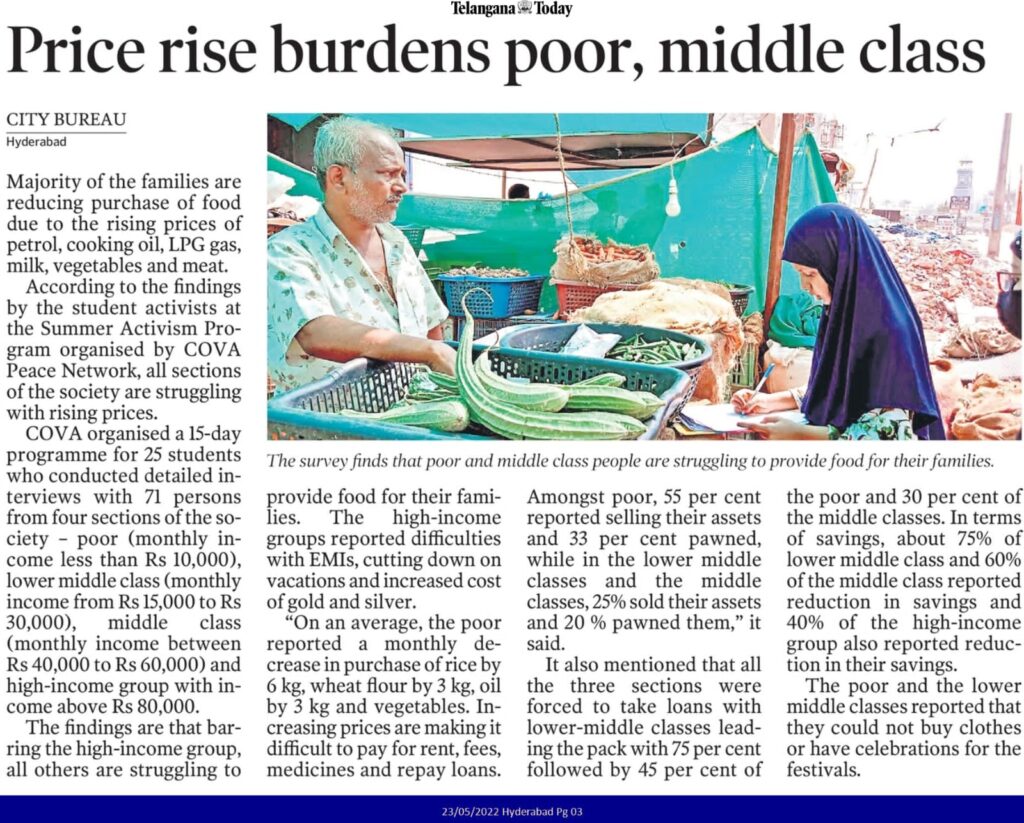
Study on Impact of Rising Prices on different Sections of Society
Detailed interviews were conducted with 71 persons from 4 Sections of Society: Poor (monthly income less than Rs. 10,000) Lower Middle Class (monthly income fromRs. 15,000 to Rs. 30,000), Middle Class (monthly income between Rs 40,000 to Rs. 60,000) and High Income Group with income above Rs. 80,000.
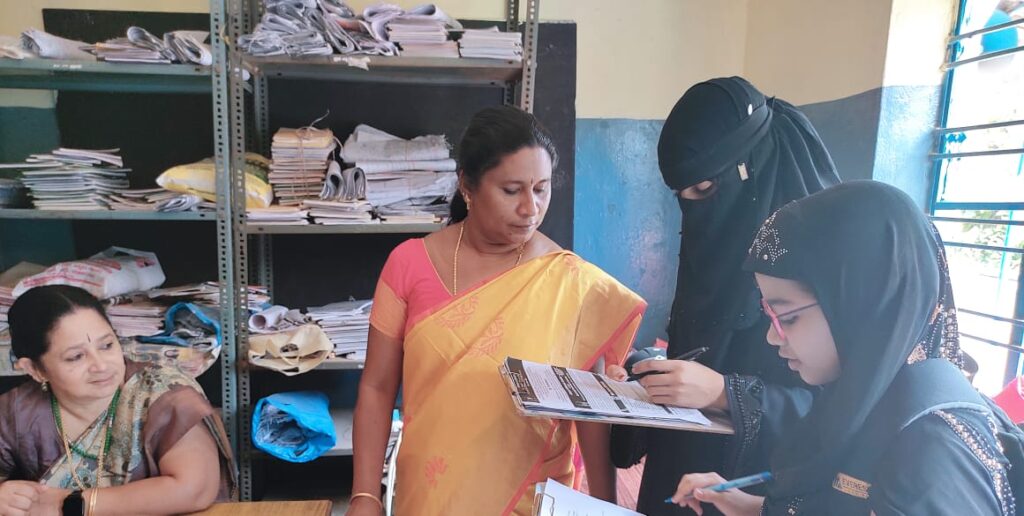
Student Activists explaining about GHMC services to Teachers of a School
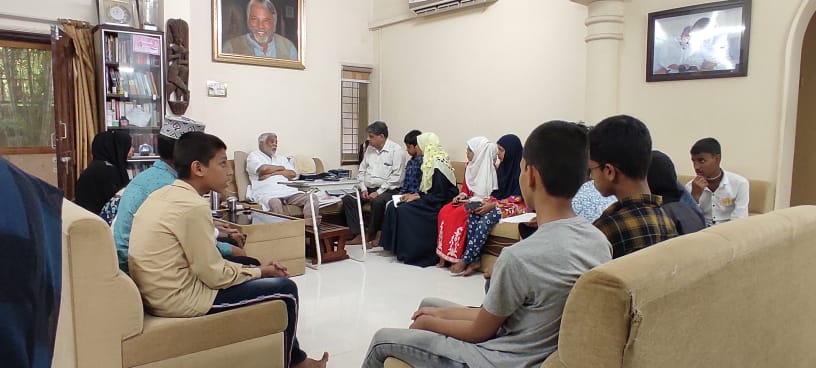
Student Activists giving Representations to Mr. K. Keshava Rao MP
Important Findings:
- Baring High Income Group, all others are struggling to provide food for their families with all sections reporting reduction in food items and the quantities they could purchase and the findings given below are for the three Sections viz. Poor, Lower Middle and Middle Classes.
- The only impacts due to rising prices the High Income Groups reported were with difficulties with EMIs, cutting down on vacations and increased cost of gold and silver.
- All three sections reported increasing struggle with costs of petrol, cooking oil, kirana, LPG Gas, milk, vegetables and meat.
- On an average, the poor reported a monthly decrease in purchase of Rice by 6 kg, Atta by 3 kg, Oil by 3 kg and Vegetables- so, even basic food is going beyond their reach.
- Reduced incomes and increasing prices are making it difficult to pay for rent, fees, medical expenses, medicines and repay loans.
- Some members from all the 3 Sections had to sell or pawn their assets like jewelry or vehicles just to provide for daily needs of the families.
- Amongst Poor, 55% reported selling their assets and 33% pawned. Of the Lower Middle Classes and the Middle Classes, 25% sold their assets and 20% pawned them.
- All the three Sections were forced to take loans with Lower Middle Classes leading the pack with 75% followed by 45% of the poor and 30% of the Middle Classes.
- Another casualty of rising prices was savings by the people. The Poor had negligible savings and now no savings. 75% of Lower Middle Classes and 60% of the Middle Classes reported reduction in savings. 40% of the High Income Group also reported reduction in their savings.
- Entertainment and outings also reduced for the poor by 73%, for Lower Middle Classes by 55%, for the Middle Classes by 53% and for the High Income Group by 37%.
- Tragically, the Poor and the Lower Middle Classes reported that they could not buy clothes or have celebrations for the festivals.
- Everyone was unanimous in their opinion that only the Government can check and reduce prices and it should act immediately.
Solutions
Based on the observations of the respondents and their own understanding, the Student Activists formulated the following solutions to reduce and check rise of prices:
- Reduction in taxes across board by the Central and State Governments on all items
- Reducing the prices of petrol and diesel to the previous level of Rs. 70 per litre.
- Both the Central and State Governments must reduce Central Excise and VAT by 50% immediately and freeze them for at least a year
- Strict regulation of school fees
- Reduction in interest rates for all personal loans and loans for small businesses taken.
- Reduction in interest rates on EMIs and increase in time for repayment
- Unemployment allowance as subsistence support.
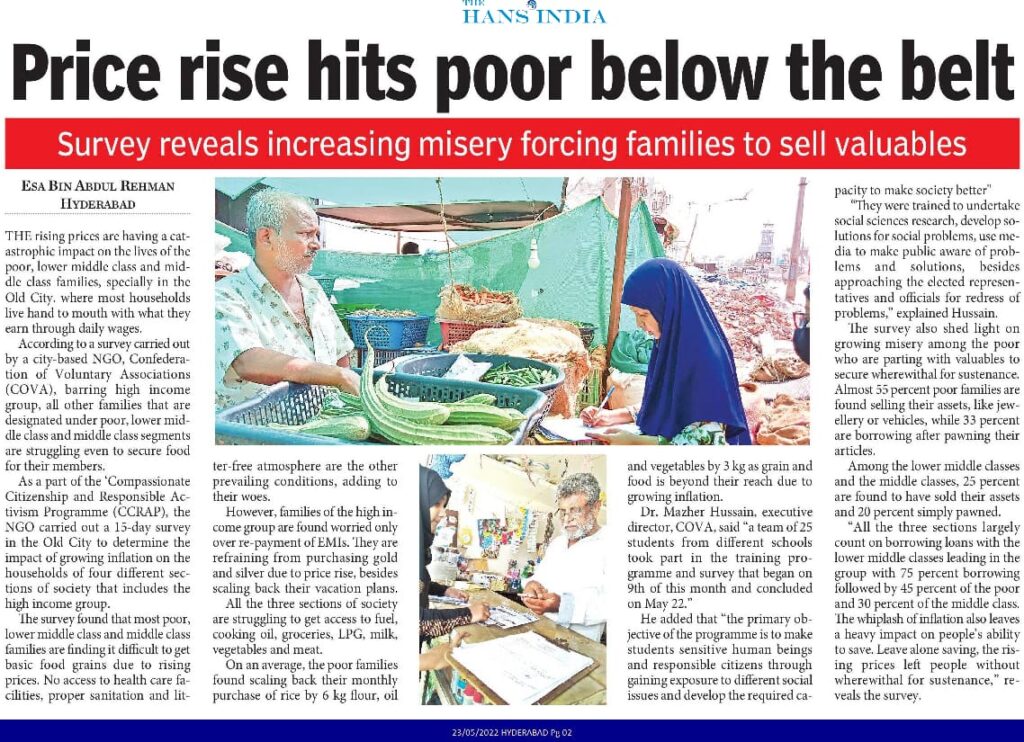 The Team of Student Activists working on civic services offered by GHMC, Water Works and Electricity departments found that there were no serious issues with the electricity department but supply of water was of concern in some areas. With GHMC, the issue of garbage on the roads in many areas has become a big problem along with irregularity in sweeping of streets,pot holes, damaged manhole covers,street lights and stray dogs etc.
The Team of Student Activists working on civic services offered by GHMC, Water Works and Electricity departments found that there were no serious issues with the electricity department but supply of water was of concern in some areas. With GHMC, the issue of garbage on the roads in many areas has become a big problem along with irregularity in sweeping of streets,pot holes, damaged manhole covers,street lights and stray dogs etc.
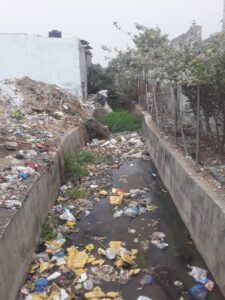
Garbage in a Nala
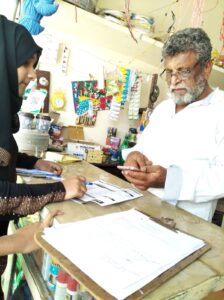
Student Activist helping a Shop Owner to Download GHMC App
The Bin Free City experience seems to be a failure so far as SAT Trolleys are not reaching every house regularly and citizens are throwing their garbage on the streets- and without Bins, garbage is spreading all over the road. There is an urgent need to put the Bins back till such time as the door to door collection is streamlined and becomes efficient.
Further, there is very little awareness amongst people about the mechanisms available to make complaints to different departments. 80% of the people had not heard about the Call Center or APP of GHMC and only 5% had lodged a complaint with APP or Call Center. Student Activists motivated 35 persons to download the APP and helped another 26 to register their complaints through the Call Center. Within 3 days, 15 complaints were successfully resolved and follow up action is underway to ensure all complaints are resolved.
The Team working on flooding of Nalas found that the major problems were encroachments and throwing of garbage in the Nalas. Though GHMC has demolished over 250 houses in Al Jubail Colony, the debris is not removed and this could lead to more flooding during the monsoon. It is important to remove all the debris and garbage from within and near the Nalas to protect the city from the threat of flooding again.
Finally, the poor are forced to construct houses on Nalas as they cannot afford any proper land near their work places in the city. International norms of Urban Planning require that a percentage of the land should be earmarked for the poor for their living space. As this is not being followed in Hyderabad, the poor encroach Nalas putting themselves and others in danger.
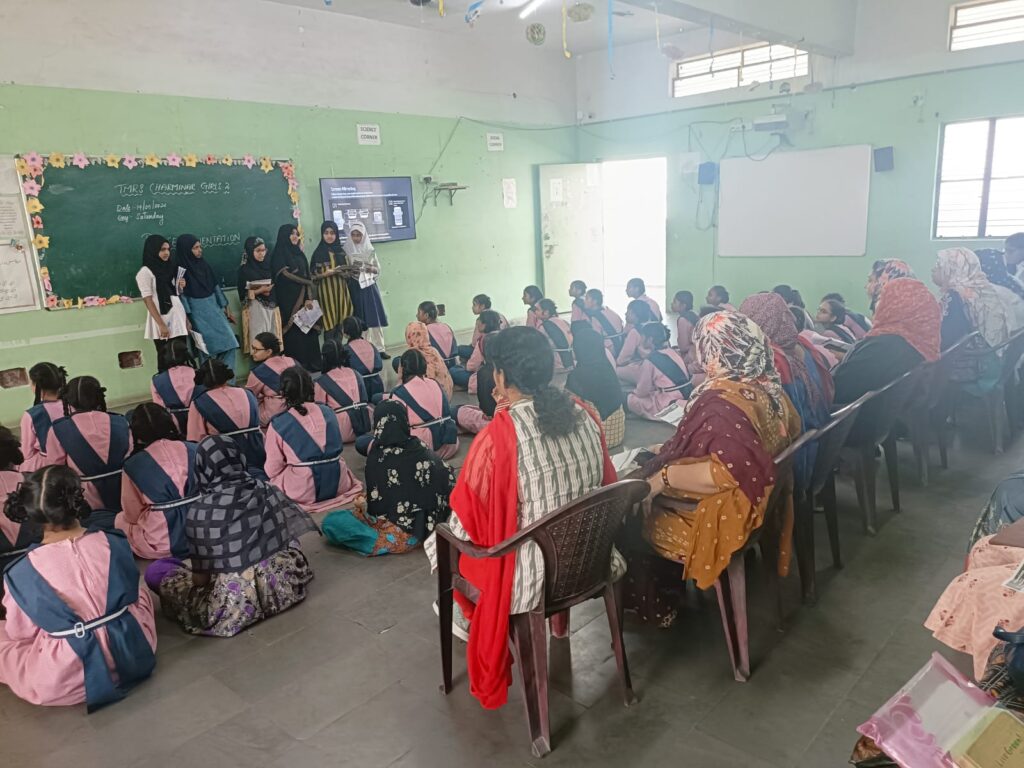
Student Activists giving orientation to Teachers and Students of a School in using GHMC App
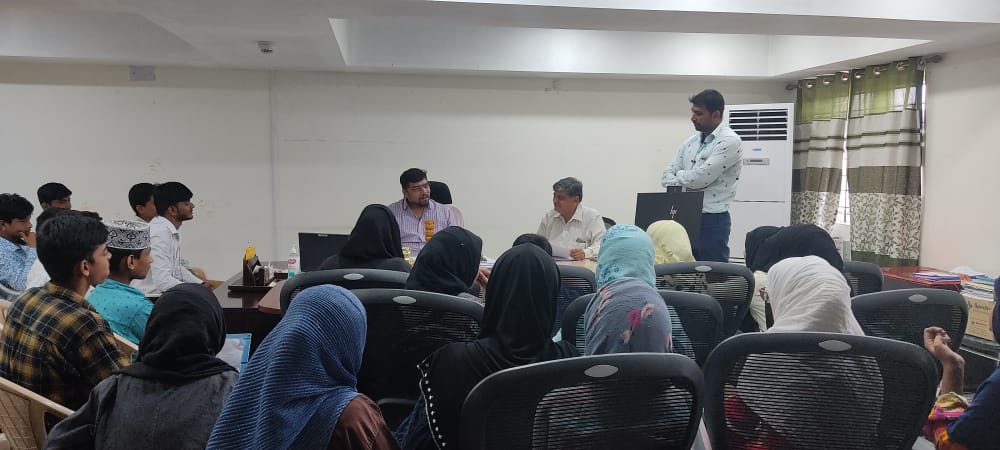
Student Activists giving representation to Mr. Ashok Samrat, Zonal Commissioner GHMC
After conclusion of their orientation and field study, Student Activists met and submitted representations to Mr. K. KeshavRao, Hon’ble Member of Parliament, Mr. Amin UlHasanJafri, Member of Legislative Council Telangana, Mr. Ashok Samrat Zonal Commissioner, GHMC and Dr. Irshad, AMOH GHMC. All these policy and decision makers appreciated their efforts and recommendations of the Student Activists and assured to take up the matters with concerned authorities. The Student Activists also visited Siasat Group to understand the functioning of different media platforms and how to use media effectively to communicate with members of the public about different social problems and mobilise support for solving them.
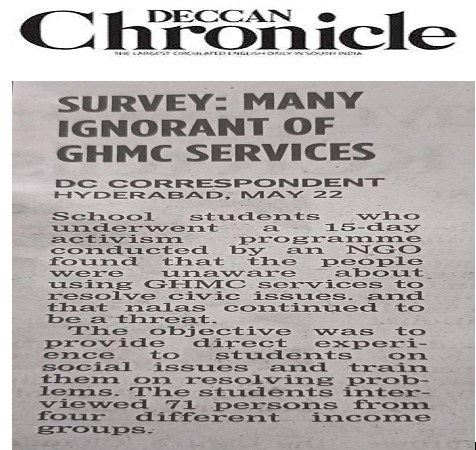 Mr. Harinder and Ms. Niveditha of RodaMistry College of Social Work provided training in how to undertake social sciences research, interview people and make systematic observations in the field. They were oriented in using media to communicate with members of the public about different social problems and mobilise support for solving them by Mr. Ehtesham, Dean, MAANU. Ms. SudhaGoparaju, development Consultant made a presentation on Rising Prices: Reasons and Consequences and Mr. NayeemudinSiddiqui of GHMC explained about the dangers of encroachment on Nalas and the initiatives by GHMC to make Nalas free of obstructions. Mr. Moinuddin Ali Khan trained them in using web for research on social issues and Dr. Mazher Hussain, Executive Director of COVA Peace Network coached them in developing solutions for social problems and giving representations to elected representatives and officials for redress of these problems.
Mr. Harinder and Ms. Niveditha of RodaMistry College of Social Work provided training in how to undertake social sciences research, interview people and make systematic observations in the field. They were oriented in using media to communicate with members of the public about different social problems and mobilise support for solving them by Mr. Ehtesham, Dean, MAANU. Ms. SudhaGoparaju, development Consultant made a presentation on Rising Prices: Reasons and Consequences and Mr. NayeemudinSiddiqui of GHMC explained about the dangers of encroachment on Nalas and the initiatives by GHMC to make Nalas free of obstructions. Mr. Moinuddin Ali Khan trained them in using web for research on social issues and Dr. Mazher Hussain, Executive Director of COVA Peace Network coached them in developing solutions for social problems and giving representations to elected representatives and officials for redress of these problems.
Mr. Mohammed Kaleem, Program Officer of COVA coordinated the Program in collaboration with Mr. M. Ajay Kumar, Finance Officer. Ms. Fatima Begum, Ms. Naziya and Ms. Naseem Begum provided all the logistics support.
All the Student Activists agreed that before enrolling in the program they had no idea about how to engage with and understand social issues and work for their resolution. They pledged to continue their engagement with different issues in their areas and strive to make society better.
Prepared by:
Dr. Mazher Hussain
Executive Director
COVA Peace Network
Email: mazher@covanetwork.org
Mob: 9394544244
With Inputs from:
The Reports of the Student Activists
